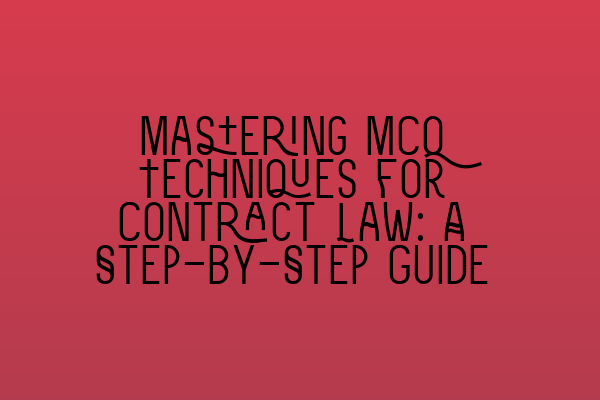Mastering MCQ Techniques for Contract Law: A Step-by-Step Guide
Welcome to our comprehensive guide on mastering Multiple Choice Question (MCQ) techniques for Contract Law! Whether you are a law student preparing for exams or a legal professional seeking to enhance your contract law knowledge, this step-by-step guide will provide you with valuable insights and strategies to tackle MCQs effectively.
Before we dive into the techniques, let’s start with a brief overview of MCQs and why they are commonly used in contract law assessments and examinations. MCQs are multiple-choice questions, where you are given various options and are required to choose the correct answer. These questions are designed to assess your understanding of legal concepts, application of the law, and critical thinking skills.
The Importance of MCQ Techniques
Mastering MCQ techniques is crucial for successfully navigating contract law assessments. It allows you to approach questions strategically, eliminate incorrect options, and increase your chances of selecting the correct answer. Effective MCQ techniques can save you time and help you avoid common pitfalls that often lead to incorrect answers.
Step 1: Understand the Question
The first step in mastering MCQ techniques is to carefully read and understand the question. Pay attention to the details and identify the legal issue being tested. Contract law often involves complex scenarios, so it’s vital to grasp the key facts and legal principles at play.
Here’s a useful tip: underline or highlight key information in the question, such as parties involved, contractual terms, and any relevant exceptions or exceptions to the general rule. This will help you stay focused and navigate through the options effectively.
Step 2: Analyze Options Systematically
Once you understand the question, it’s time to analyze the provided options. Avoid rushing through the choices and consider each one methodically. Start by eliminating options that are clearly incorrect. Look for any choices that contradict the facts or legal principles identified in Step 1.
To further narrow down your options, consider the following:
- Identify options that are too broad or too narrow, compared to the legal issue.
- Look for options that contain extreme language, like “always” or “never.” These are often incorrect as legal principles are rarely absolute.
- Consider any exceptions or qualifications mentioned in the question. Look for options that align with these exceptions or qualifications.
- Compare the remaining options against each other and choose the most reasonable and logical choice.
Step 3: Use Legal Knowledge and Reasoning
Utilize your contract law knowledge and critical thinking skills to analyze the options further. Consider any relevant legal precedents, statutes, or case law that may influence the correct answer. Think about how the law should be applied to the given scenario and eliminate options that contradict established legal principles.
Remember to stay objective and unbiased. Don’t let personal opinions or assumptions cloud your judgment. Base your decision on legal reasoning and logical deductions.
Step 4: Practice, Practice, Practice
Like any skill, mastering MCQ techniques for contract law requires practice. The more you expose yourself to different types of MCQs, the better you will become at identifying patterns and applying the techniques effectively.
Take advantage of practice exams, online resources, and textbooks focused on contract law. Additionally, seek mentorship from experienced solicitors or legal professionals to gain valuable guidance and insights into tackling MCQs.
Conclusion
By following these step-by-step techniques, you can enhance your ability to tackle MCQs in contract law assessments. Remember to take your time, read the questions carefully, analyze options systematically, utilize your legal knowledge, and practice regularly. With persistence and dedication, you’ll soon develop the skills needed to confidently approach contract law MCQs.
For further guidance on your legal journey, check out these related articles:
- Mentorship for Aspiring Solicitors: Nurturing Talent in the Legal Field
- Mentorship for Aspiring Solicitors: Finding Guidance on Your Legal Journey
- Exploring Alternative Dispute Resolution: An Effective Approach to Legal Conflicts
- The Art of Contract Drafting and Negotiation: Skills Every Solicitor Should Master
- What Can You Expect: The Average Solicitor Salary in the UK
Remember, practice makes perfect, and with the right techniques, you’ll be well-equipped to excel in your contract law assessments!
